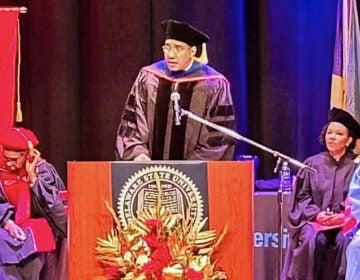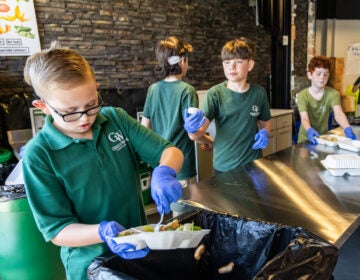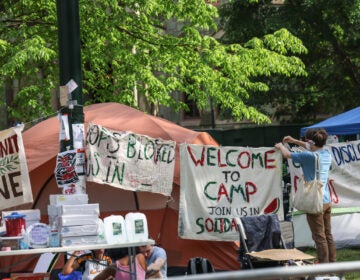Camden begins ambitious mentoring plan in city schools
Its no secret that Camden’s public schools have been struggling for decades. New Jersey Governor Christie is preparing initiatives for the school district, to be revealed over the next few months.
But in the mean-time, a small, yet significant mentoring program has taken root at Molina elementary.
“Let me see you standing tall,” said Settlement Music School’s Rae Ann Anderson. “Put your instrument in its best working order. Give yourself a lot of air–big pillow of air–and sing ‘heyoheyoh oongoowa.’
The R.C. Molina elementary school is a plain, brown-brick building seemingly plopped into a neighborhood of tightly packed row-homes in North Camden. One recent sunny afternoon, the building was alive with young voices as they explored songs from around the world, with the help of Settlement Music School’s Rae Ann Anderson.
While down the hall, in the library, there was homework and tutoring.
The buzz of after-school activity comes from a new mentorship program the city and Rutgers/Camden have created. Last year, only 14 percent of Molina’s fourth-graders scored proficient in language arts on state tests. Twenty-three percent scored that well in math.
“Knowing the stress that that they encounter in their communities, our young people cry out for a need for mentoring, and I think this is a great time to begin to make something happen, on scale, in Camden City,” said Reuben Mills, deputy superintendent of Camden’s public schools.
Mills sees mentoring as a key to turning things around for children who come to school carrying the weight of the world on their shoulders..”
“We make sure that they’re fed breakfast, we make sure they have their lunch we make sure that any other thing we need to equip them with as far as their health needs are concerned, any social needs that may occur,” said Mills.
The Rutgers ambassador program, as its called, is there after school and attempts to push kids to the next level using committed college students. Jardaine Brown coordinates the Rutgers-Camden Partnership.
“They have to have that burn inside them to wanna help these students,” said Brown. That’s first and foremost for me. You know, low socio-economic students, disadvantaged students, they have to have an understanding of the environment they’re coming in to. That’s one of the main keys I look for, that they have an understanding of the environment they’re coming in to.”
This spring the ambassadors worked at three Camden schools: Molina, Coopers Point, and Pyne Point; offering tutoring, chess, choir and even martial arts.
Why the word ambassador instead of mentor?
According to Nyeema Watson, director of public school partnerships for Rutgers, ‘ambassador’ best illustrates the relationship between the university and city.
“This is our community also and the success of the university is tied to the success of the city,” said Watson. “We have a lot of resources on campus: human capital resources, physical resources, we are very good at fundraising money so the goal is to really use all of our capital, to help the school district meet their goals.”
Dominique Baker is an ambassador who’s studying to be a teacher. “You never know what to expect when you come in here,” she said. “You always have to be ready and on your toes, ready for whatever they’re going to throw at you. and I love being here”.
Rutgers plans to expand the ambassador program in the fall to include two high schools: Woodrow Wilson and Creative Arts . The focus there will be on college: according to Andrew Seligsohn, director of civic engagement at Rutgers/Camden. Rutgers students will start by mentoring the high schoolers.
“And so then the high school students will be turning around and working with the younger students in preparing for high school, and how to think about the transition to high school in terms of their future and getting ready for college and their lives thereafter,” said Seligsohn.
And key in these tough economic times: the program does not stress the city schools’ budget.
“The North Camden project did not take a lot of money, didn’t take a lot of funding,” said Reubin Mills. “It just took a lot of people with good ideas, who were willing to come to the table and make something work.”
Mills has a larger and more urgent goal. He wants to see most of Camden’s 13,000 school students under the mentorship umbrella in just a few years time. He envisions involving other institutions.
In the meantime, as officials wait to see whether the program at Molina will have a positive impact on test scores, Principal Gloria Martinez-Vega offers an early appraisal: “Its extraordinary for our children. It definitely is.”
WHYY is your source for fact-based, in-depth journalism and information. As a nonprofit organization, we rely on financial support from readers like you. Please give today.




